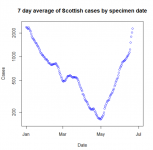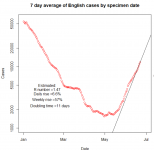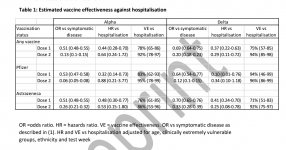dooderooni
Well-known member
Part of the slowdown in vaccination will be those who are vaccine hesitant. The US are showing the same trend.
When cases were at this level las October, there were 43 deaths per day over 7 days; they're currently 17 deaths a day so significantly less, but not 'zero'.Deaths in single figures though which is bad for the families involved but shows vaccines are clearly working.
To get the whole picture I guess you would need to know how many deaths in the full vaccinated and part vaccinated.When cases were at this level las October, there were 43 deaths per day over 7 days; they're currently 17 deaths a day so significantly less, but not 'zero'.
There was a Sage scientist today saying there is updated research on this, but the paper hasn't been peer reviewed.To get the whole picture I guess you would need to know how many deaths in the full vaccinated and part vaccinated.
Be interesting to see what it's on the paper bear.There was a Sage scientist today saying there is updated research on this, but the paper hasn't been peer reviewed.
Out of 67+ million bear remember.When cases were at this level las October, there were 43 deaths per day over 7 days; they're currently 17 deaths a day so significantly less, but not 'zero'.


I know vaccines, and I know young uns but I can’t help but worry about the rise in casesAs of 9am on 29 June, 4,775,301 people have tested positive for COVID-19 in the UK.
Positive cases were 20,479 (11,625 on corresponding day last week).
23 deaths were reported today (27 on corresponding day last week).
152,606 deaths with Covid-19 on the death certificate (up to 18 June).
44,581,771 have had a first dose vaccination. 127,260 first dose vaccinations yesterday. 32,721,762 have had a second dose. 138,016 second dose vaccinations today.
The extra time has been supercritical, as every day goes on, the average age of the susceptible to getting covid goes down (as we vaccinate higher ages and work back to younger ones), and the risk average of each case comes down (younger are less risk). More cases of younger people aren't really much of an issue (not for hospitalisations and deaths), but it could be from long term covid complications.It’s an interesting one with hospitalisations and deaths. Hospitalisations only up 10% WoW deaths down 2 days in a row (albeit minute data sample and could be delays, reflected in coming days)
Could it be that the extra time it’s taken to spread out from the surges in Bolton has allowed a significant enough number of people to get a 1st/2nd jab has made a big difference? Will the tide start to turn with cases to over the next 4-5weeks?
What is this immunity decrease? I guess I needed worry yet as my jab 2 is only 3 days old but haven't seen anything on how bad this is.All the time there is a slight immunity decrease of those who have had 2 jabs a while back, but the loss in this is seemingly tiny in comparison to the gain of younger people just getting one dose.
I guess that's where the booster jab comes in. Not sure what the recommended gap is between the 2nd jab and the booster.What is this immunity decrease? I guess I needed worry yet as my jab 2 is only 3 days old but haven't seen anything on how bad this is.
What I’m keen to know is re first jab, the figures that have been quoted re effectiveness vs Delta are 30% after 3 weeks vs 50% vs Alpha.What is this immunity decrease? I guess I needed worry yet as my jab 2 is only 3 days old but haven't seen anything on how bad this is.
For some reason the paper that had that information isn't directly linked anymore. A table from the report below. Reading summaries from various reports at the time, the three weeks refers to at least three weeks after the first jab. So it covers 3 weeks till a second jab.What I’m keen to know is re first jab, the figures that have been quoted re effectiveness vs Delta are 30% after 3 weeks vs 50% vs Alpha.
Now why was that 3 week data point used? Is that maximum effectiveness vs Deta and that’s as good as you’re going to get from it? Or does effectiveness continue to build over weeks 4/5/6 and the 3 week data point was used for another purpose I.e that’a the average length of time those people with one jab had been vaccinated for based on the roll out figures at the time for instance?

